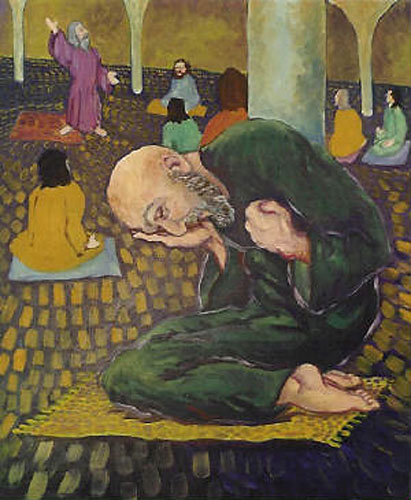Hunger Games: WWJD?
“Survival is not the highest good.”
Doug Wilson tackles contrived ethical dilemmas in his review of The Hunger Games.
Continue reading
“Survival is not the highest good.”
Doug Wilson tackles contrived ethical dilemmas in his review of The Hunger Games.
Continue reading
“This coffee falls into your stomach… sparks shoot all the way up to the brain. From that moment on, everything becomes agitated. Ideas quick-march into motion like battalions of a grand army to its legendary fighting ground, and the battle rages. Memories charge in, bright flags on high; the cavalry of metaphor deploys with a magnificent gallop; the artillery of logic rushes up with clattering wagons and cartridges; on imagination’s orders, sharpshooters sight and fire; forms and shapes and characters rear up; the paper is spread with ink—for the nightly labor begins and ends with torrents of this black water, as a battle opens and concludes with black powder.”
— Honore de Balzac
 Some excerpts from David P. Goldman’s essay, “Admit It, You Really Hate Modern Art,” in It’s Not the End of the World, It’s Just the End of You: The Great Extinction of the Nations.
Some excerpts from David P. Goldman’s essay, “Admit It, You Really Hate Modern Art,” in It’s Not the End of the World, It’s Just the End of You: The Great Extinction of the Nations.
Why is it that the audience for modern art is quite happy to take in the ideological message of modernism while strolling through an art gallery but loath to hear the same message in the concert hall? It is rather like communism, which once was fashionable among Western intellectuals. They were happy to admire communism from a distance, but very few chose to live under communism.
 Following a masterful and beautiful explanation of Israel’s priestly glory, Alastair Roberts writes:
Following a masterful and beautiful explanation of Israel’s priestly glory, Alastair Roberts writes:
In 1 Corinthians 11:7 we encounter a verse that many might find perplexing.
For a man indeed ought not to cover his head, since he is the image and glory of God; but woman is the glory of man.
I believe that careful attention to the logic of this verse is absolutely crucial to unlocking the puzzle of the difference between the female helper apostle, and the male helper apostle.
Here’s a brilliant video just uploaded by my online friend Daniel Foucachon. It levels the playing field in the Creation/Evolution debate.
Continue reading

“The abundant life is a life that is constantly being beheaded by the truth.”
“For I say to you, that unless your righteousness exceeds the righteousness of the scribes and Pharisees, you will by no means enter the kingdom of heaven.” (Matthew 5:20)
You may have had some experience with a “legalistic” church or Christian. We all know that a domineering leadership is a curse to the work of God, but so many people who make the decision to leave such ministries, or individuals, behind become “lawless” in their liberty. What’s really going on there, and what is the Bible’s solution for legalism?
[This post has been refined and included in Sweet Counsel: Essays to Brighten the Eyes.]
Continue reading
It’s now official. Kirk Cameron’s been hanging around with Darren Doane and Gary DeMar. He’s left the erroneous theology of Tim LaHaye’s silly books behind and embraced the optimism of postmillennialism — the Biblical teaching that the gospel will be victorious in history, through self-sacrifice.
Cheer up, you dispies. It’s not the end of the world.
“What is the meaning of ”one is taken and the other left’? This is commonly thought to refer to the rapture — one taken up into heaven, and the other left on earth to kick himself for not praying the sinner’s prayer when he had a chance. On the bright side, there will be a lot of free, unmanned cars available” (Heaven Misplaced, p. 104).
Matthew 24 is a prediction of the Covenant curses falling upon Judah for the last time. One being taken and the other left has to do with displacement. Titus enslaved the best Jews and took them in ships to Egypt.
“And the Lord will take you back to Egypt in ships, by the way of which I said to you, ‘You shall never see it again.’ And there you shall be offered for sale to your enemies as male and female slaves, but no one will buy you.” (Deuteronomy 28:68)
It’s one thing to get the historical fulfilment correct, but there’s a whole lot more going on here. In His speech, as the fulfilment of Israel, Jesus is working through the Bible Matrix, a combination of the Creation week, the weekly and annual Feasts, and the process of Dominion. This means that He is using examples of all the previous historical Covenant structures to make His point. The Covenant cycle has snowballed through history and picked up a lot of events on its way.
Andrew Hong summarizes some ancient Confucian rites and their meanings, and then writes:
We don’t have many rituals in our modern world – but if you take that one simple ritual, and multiply that into every sphere of life, and every relationship, then you are coming close to the kind of society that Confucius sought to create through the rites. The rites become the means for society to go from inhumane behaviour (in the form of warfare during the Warring States period) to humane and dignified behaviour.
The rites were also the way for society to go from disordered relationships (in the form of rebellion) to ordered and reverential relationships… You may recall that there were five key relationships in the Confucianism: ruler-subject, father-son, husband-wife, older-younger, and friend-friend. These relationships were largely hierarchical in nature, and the rites gave people a way to express and reinforce those relationships.
This is what missiologist Paul Hiebert has to say about the importance of rituals,
“Modern people commonly regard rituals as harmless interludes or discount them as meaningless performances. But rituals play a central role in most societies. They are multilayered transactions in which speech and behaviour are socially prescribed. [...] They give visible expression to the deep cultural norms that order the way people think, feel, and evaluate their worlds. [...] Because rituals dramatise in visual form the deep beliefs, feelings, and values of a society, they are of particular importance in studying worldviews.” Paul Hiebert, Transforming Worldviews, 82-83.